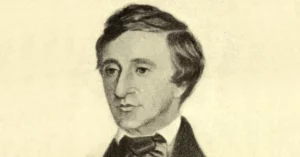The Milky Way, the Pond, and the Meaning of Life: Thoreau on Solitude, Sympathy, and the Salve for Melancholy
INSPIRATIONAL, 30 Sep 2024
Maria Popova | The Marginalian – TRANSCEND Media Service
 “These are the times in life — when nothing happens — but in quietness the soul expands,” the artist Rockwell Kent wrote as he was finding himself on the solitary shores of Alaska, contemplating the relationship between wilderness, solitude, and creativity while immersed in the writings of the Transcendentalist philosopher and poet Henry David Thoreau (July 12, 1817–May 6, 1862).
“These are the times in life — when nothing happens — but in quietness the soul expands,” the artist Rockwell Kent wrote as he was finding himself on the solitary shores of Alaska, contemplating the relationship between wilderness, solitude, and creativity while immersed in the writings of the Transcendentalist philosopher and poet Henry David Thoreau (July 12, 1817–May 6, 1862).
Since its publication on August 9, 1854, Thoreau’s Walden (public library | public domain) has gone on to inspire generations with its pure hearted ethos, its prayerful passion for the living world, and its singular lens on how human nature is annealed by communion with the rest of nature.
In one of the boldest and most shimmering passages in all of literature, Thoreau writes:
“I went to the woods because I wished to live deliberately, to front only the essential facts of life, and see if I could not learn what it had to teach, and not, when I came to die, discover that I had not lived.”
Solitary by nature, Thoreau let solitude nurture him in the cabin he built for a total of $28.12½ on the shore of a small lake in New England, where his nearest neighbor was a mile away and all about he could see only hilltops. He writes:
It is as solitary where I live as on the prairies. It is as much Asia or Africa as New England. I have, as it were, my own sun and moon and stars, and a little world all to myself.
[…]
I find it wholesome to be alone the greater part of the time. To be in company, even with the best, is soon wearisome and dissipating. I love to be alone. I never found the companion that was so companionable as solitude. We are for the most part more lonely when we go [out among others] than when we stay in our chambers.
Nearly a century later, Rilke channeled the underlying elemental truth in his observing that “there is only one solitude, and it is large and not easy to bear” as he reckoned with the relationship between solitude, intimacy, and creativity, concluding: “People are drawn to the easy and to the easiest side of the easy. But it is clear that we must hold ourselves to the difficult.”
And yet on the other side of the difficult, once we cease trying to control life out of loneliness and instead surrender to the elemental solitude — there lies an ease with an edge of ecstasy. That is what Thoreau discovered at Walden. In one of the most transcendent passages from the book — an exquisite specimen of the unphotographable — he writes under the heading “Solitude”:
This is a delicious evening, when the whole body is one sense, and imbibes delight through every pore. I go and come with a strange liberty in Nature, a part of herself. As I walk along the stony shore of the pond in my shirt sleeves, though it is cool as well as cloudy and windy, and I see nothing special to attract me, all the elements are unusually congenial to me. The bullfrogs trump to usher in the night, and the note of the whippoorwill is borne on the rippling wind from over the water. Sympathy with the fluttering alder and poplar leaves almost takes away my breath; yet, like the lake, my serenity is rippled but not ruffled.
[…]
There is commonly sufficient space about us. Our horizon is never quite at our elbows. The thick wood is not just at our door, nor the pond, but somewhat is always clearing, familiar and worn by us, appropriated and fenced in some way, and reclaimed from Nature. For what reason have I this vast range and circuit, some square miles of unfrequented forest, for my privacy, abandoned to me by men?

Two generations later, Hermann Hesse would arrive at his own answer, which might be the universal answer: “Solitude is not chosen, any more than destiny is chosen,” Hesse wrote as he contemplated solitude, the courage to be yourself, and how to find your destiny. “Solitude comes to us if we have within us the magic stone that attracts destiny.”
Solitude chose Thoreau as much as he chose it, for in it he found a remedy for the most somber recesses of his destiny: his frequent spells of depression, for which, in the epochs before medication, he knew no better medicine than unpeopled time in nature:
The most sweet and tender, the most innocent and encouraging society may be found in any natural object, even for the poor misanthrope and most melancholy man. There can be no very black melancholy to him who lives in the midst of Nature and has his senses still.
From the the personal he pivots to the universal, from the creaturely to the cosmic:
This whole earth which we inhabit is but a point in space. How far apart, think you, dwell the two most distant inhabitants of yonder star, the breadth of whose disk cannot be appreciated by our instruments? Why should I feel lonely? is not our planet in the Milky Way? This… to me not to be the most important question. What sort of space is that which separates a man* from his fellows and makes him solitary? I have found that no exertion of the legs can bring two minds much nearer to one another.
This may be the most haunting and most transcendent discovery for any of us who seek and savor those long salutary solitudes under branch and cloud: the realization that the price of consciousness is loneliness, for infinite space and infinite incomprehension exists between any two minds and their singular umwelts. Life may be the art of bridging lonelinesses, but we are born into the one great solitude and die into it. The value of the space between the bookends is what we might call love. Or art.

Complement these fragments of the altogether soul-slaking Walden — which includes Thoreau’s abiding wisdom on the courage to define your own success, even against the tide of convention — with May Sarton on solitude as the seedbed of self-discovery and the cure for despair, Kahlil Gibran on silence, solitude, and the courage to know yourself, and Buddhist scholar Stephen Batchelor on the art of solitude as contemplative and creative practice, then revisit Thoreau on nature as prayer, knowing vs. seeing, and what it means to be awake.
_______________________________________
 My name is Maria Popova — a reader, a wonderer, and a lover of reality who makes sense of the world and herself through the essential inner dialogue that is the act of writing. The Marginalian (which bore the unbearable name Brain Pickings for its first 15 years) is my one-woman labor of love, exploring what it means to live a decent, inspired, substantive life of purpose and gladness. Founded in 2006 as a weekly email to seven friends, eventually brought online and now included in the Library of Congress permanent web archive, it is a record of my own becoming as a person — intellectually, creatively, spiritually, poetically — drawn from my extended marginalia on the search for meaning across literature, science, art, philosophy, and the various other tendrils of human thought and feeling. A private inquiry irradiated by the ultimate question, the great quickening of wonderment that binds us all: What is all this? (More…)
My name is Maria Popova — a reader, a wonderer, and a lover of reality who makes sense of the world and herself through the essential inner dialogue that is the act of writing. The Marginalian (which bore the unbearable name Brain Pickings for its first 15 years) is my one-woman labor of love, exploring what it means to live a decent, inspired, substantive life of purpose and gladness. Founded in 2006 as a weekly email to seven friends, eventually brought online and now included in the Library of Congress permanent web archive, it is a record of my own becoming as a person — intellectually, creatively, spiritually, poetically — drawn from my extended marginalia on the search for meaning across literature, science, art, philosophy, and the various other tendrils of human thought and feeling. A private inquiry irradiated by the ultimate question, the great quickening of wonderment that binds us all: What is all this? (More…)
Go to Original – themarginalian.org
Tags: Henry David Thoreau, Inspirational, Life, Nature, Philosophy, Solitude, Wisdom
DISCLAIMER: The statements, views and opinions expressed in pieces republished here are solely those of the authors and do not necessarily represent those of TMS. In accordance with title 17 U.S.C. section 107, this material is distributed without profit to those who have expressed a prior interest in receiving the included information for research and educational purposes. TMS has no affiliation whatsoever with the originator of this article nor is TMS endorsed or sponsored by the originator. “GO TO ORIGINAL” links are provided as a convenience to our readers and allow for verification of authenticity. However, as originating pages are often updated by their originating host sites, the versions posted may not match the versions our readers view when clicking the “GO TO ORIGINAL” links. This site contains copyrighted material the use of which has not always been specifically authorized by the copyright owner. We are making such material available in our efforts to advance understanding of environmental, political, human rights, economic, democracy, scientific, and social justice issues, etc. We believe this constitutes a ‘fair use’ of any such copyrighted material as provided for in section 107 of the US Copyright Law. In accordance with Title 17 U.S.C. Section 107, the material on this site is distributed without profit to those who have expressed a prior interest in receiving the included information for research and educational purposes. For more information go to: http://www.law.cornell.edu/uscode/17/107.shtml. If you wish to use copyrighted material from this site for purposes of your own that go beyond ‘fair use’, you must obtain permission from the copyright owner.
Join the discussion!
We welcome debate and dissent, but personal — ad hominem — attacks (on authors, other users or any individual), abuse and defamatory language will not be tolerated. Nor will we tolerate attempts to deliberately disrupt discussions. We aim to maintain an inviting space to focus on intelligent interactions and debates.
